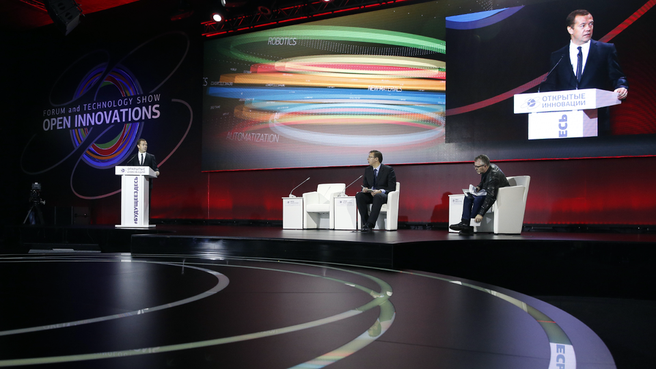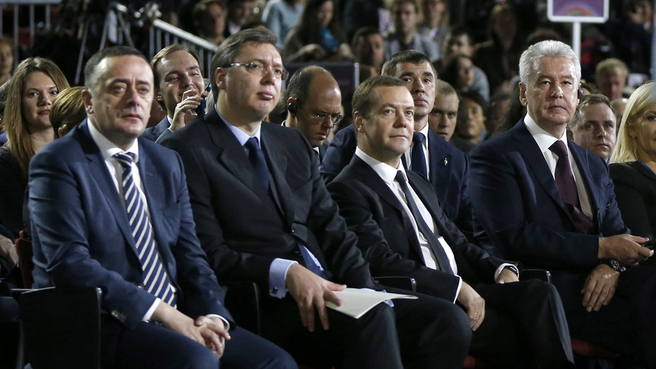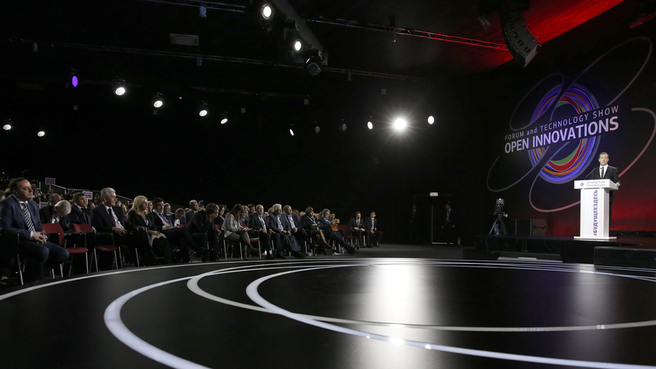The theme of the plenary session is Humanity in the Centre of the Technological Revolution.
Dmitry Medvedev’s address at a plenary session
Remarks by Prime Minister of the Republic of Serbia Aleksandar Vučić at a plenary session
The Open Innovations Forum has been held in Moscow every year since 2012. The forum first chose a partner country in 2013, when it was Finland and France. The partner country in 2014 was China, and this year it is Serbia.
Each day of the five-day forum will focus on one of the five spheres of human life affected by the technological revolution: productivity, habitat, education, health and entertainment. The theme of the forum this year is Humanity in the Centre of the Technological Revolution.
The forum will be attended by the senior officials of federal executive agencies, representatives of major global corporations, researchers and experts on business innovation.
Excerpts from the transcript:
Dmitry Medvedev: Progress cannot be stopped. There have been three industrial revolutions, and there will likely be a fourth one. We keep asking what we should do in this situation – implement innovations or let the economy take its course? Should the government interfere in this process, or should it let business cope on its own? What procedure is best? And how can we protect inventions aside from through patents?
All of this will take time. On the other hand, solutions should be global in nature. You can devise the best possible system and adopt ideal laws, but the system will stumble across the global nature of communications and global changes underway in all spheres of knowledge and in all industries. How can this challenge be addressed? This is a task for all national governments.
Changes are as rapid in Russia as in all other countries. The business environment in Russia is becoming more predictable. We have more opportunities for investing in infrastructure, for creating a more favourable environment for innovation, for implementing such projects as Skolkovo and for venture investment.
We will continue the policy of supporting the innovative growth of our economy, which is a government responsibility. There is no alternative to innovative development, not even in a country with colossal energy resources. The main thing is to keep up the pace, to become part of global technological development and to occupy an appropriate place in this sphere.
A new technology boom has begun, with many rather unexpected technological changes. Breakthroughs can be made where no one expects them, because the process itself takes a long time. It’s all but impossible to predict what will become a trend 10 or 20 years from now. Look at how many forecasts have come true and how many have failed. And the legal framework is always lagging behind these changes.
However, I’d like to focus on a few related trends, which are crucial for the interests of governments and nations.
The first trend is the restructuring of the employment market and the growing share of creative jobs. The priority is on the characteristics that distinguish a person from a robot: the ability to dream and to create. Humankind's exclusive right to invention and design, to the results of his intellectual endeavours, must be protected by legislation, including supranational laws. Humankind has not progressed much in this sphere, because the heads of state and government don’t care for this issue. In my opinion, we should have addressed this issue long ago.
The second trend is that the new generations were born into a digital world. The Government must take this into account in its work.
Modern communication platforms offer a new way to organise collective action and to rally people for implementing public initiatives. Their use increases the accountability and openness of the bodies of authority, from municipal authorities to federal governments. The authorities should take this into the account in their daily operation too.
The third trend consists of breakthroughs in a number of vital technologies, including biomedicine. The social reality is changing, with new opportunities for improving health. And so we must focus on this. This is something all states and governments must keep sight of.
Another trend is digital education in the globalised world. Education has become a lifelong process. Open platforms are erasing the remaining geographical borders. The educational process is becoming increasingly dynamic, with more elements of play. And the traditional system of education must react to these factors. We cannot pretend that this is not happening, that we can carry on with traditional schools and universities, and that everything else is just modern fads we can safely disregard.
Russia is a large country with many regions, which are entering the new globalised world separately from each other. Some of them are doing this sooner than others, which are held back by inertia, but we must take all of these elements into account.
Russia is the proud home to many inventions. But we remember many examples when discoveries were not implemented here, and their creators eventually took them to some other country. We must create a system where talented inventors not only have the opportunity to make their inventions but also have access to infrastructure for commercialising them. This is not only the Government’s responsibility, especially since people in Russia and in many European countries trust their governments in this sphere less than people in China or Japan do.
Today many traditional industries are changing under the impact of new industrial technologies. Some people are even saying that certain innovations have a subversive effect because their introduction is transforming markets and changing the very nature of competition, with entire economic sectors ending up thrown overboard. This must be taken into consideration in light of such a big problem as unemployment. Leading countries should pay more attention to this.
Can we forestall all these tendencies at the state and political level? Of course not. We can forestall and take into account only part of them. The state should help create an environment by formulating laws, opening access to certain crucial sectors (healthcare, education) for investment, creating special infrastructure in the form of participation in technology parks and ensuring labour market regulation and support for education. But in a comprehensive way all these tasks can only be tackled by all those involved in the innovation process. I am primarily referring to the business community, scientists, educators and consumers.
One of these comprehensive projects that we are implementing in this country is called the National Technology Initiative. It includes a system of roadmaps that form a kind of network. Actually we are trying to capture the contours of budding markets and the most important trends, and to create conditions for Russian companies to find a befitting place in these markets. Just a few days ago, a procedure for implementing these roadmaps was approved.
We are open to any
type of cooperation because no state is able to address these large-scale and
diverse tasks singlehandedly. The benefits will be reaped by those capable of
creating the most comfortable business environment, a competitive jurisdiction
and attractive living conditions for creative people. We would like Russia to
be one of these places.
Aleksandar Vučić (via interpreter): I come from a country that is the birthplace of Nikola Tesla and Mihajlo Pupin. Their inventions and achievements have changed the course of human history. But I also come from a country that, according to its academic potential, cannot be compared today to many other countries that are far ahead of us in terms of research, technology and innovations.
Russia ranks 7th in terms of domestic patents, and 25th in terms of international patents. Serbia ranks much lower than that, with only 200 patents. Mostly, these patents come from the private sector, which acquired knowledge on its own, resurged, and showed a drive towards innovation. The great power of this sector and a new generation of people who were trained at academic institutions other than Serbian ones is one of the things that the state must support in the future.
The developments in many other countries are telling us that investing in start-up companies, through the use of loans, and so on, can be hugely beneficial. In our region, we are doing fairly well as compared with some other countries in terms of the level of IT development, but are lagging behind in certain other areas. Importantly – and I would like to learn this from you and many others – we must change ourselves.
I think that if your economy starts growing, you will resolve all your problems.
I’m a little concerned by the predictions that there will be more changes in the next 20 years than there were over the past 200 years. I’m not a modern person, I don’t even own a smartphone and, like most people, the workers in our country, I’m looking at what innovations have in store for us. These workers are afraid of losing their jobs, and I’m afraid to show that I want to be too trendy and keep up with the latest developments. Prime Minister Medvedev said that there’s no alternative to this, and we must keep up with the new era. If we don’t, society will lose. Our future will largely depend on our ability to introduce innovative technologies.
To do so, we have to meet two important prerequisites. We will carry out reforms, and we will work to train our people. We have boldly embarked on the path of major reforms, adopted constitutional fiscal measures and reformed the labour market. Initially, no one in Serbia liked it, but now people are seeing the first improvements that took place despite major painful reforms.
There will come a time when people will work two or three hours a day and study two or three hours a day to master new technologies. Similarly students will study for five hours and have hands-on training for another two to three hours as they prepare for future work.
In Russia and Serbia, we suddenly started having lots of lawyers, managers and so on beginning in the 1990s. Nobody wanted to be a machine-builder or an engineer. So, there’s a lack of workers. Along with Germany and some other countries, we are trying to introduce dual education in Serbia. I know that I’ll run into a lot of resistance in our country, but these things must be changed in a major fashion. We will have to carry out major reforms in the education sector, since this is an important prerequisite for our country’s development.
In our country, all the global companies are using the talent of our young people, including Microsoft, Acer and others. But we also have successful domestic IT companies, and I hope that we will be able to provide a better future for them.
We have much to learn from Russia and others. I am impressed by the organisation of this forum.
We will continue our training and our difficult reforms in order to stay abreast of global progress.
Dmitry Medvedev: To completely ignore the achievements of scientific and technical progress is impossible, and probably not very wise.
We have put this work on a sound regulatory basis in the past few years. We have a proper regulatory environment in legislation, one that is civilised and modern. The issue boils down to its practical application, and this is a much more sophisticated task.
We are trying to create symbiosis between the approaches of the state on the one hand, and the ideas of businesses, on the other. We are striving to put everything on the platform of public-private partnership because the development of the innovation-based economy is not just a task for the state. A no less important role in this effort is played by businesses, public agencies, education, science and customers – all actors of the research and technology world and the modern economy.
We came up with the National Technological Initiative. Later on we converted it into a package of plans on the most critical and interesting technological solutions. These include the NeuroNet, a roadmap to address the current problems of the brain and the use of computer technology, the AutoNet, to focus on self-driving transport vehicles, and many other ideas with approved roadmaps that show how to move forward. The idea of these roadmaps is to encourage private initiative and accelerate its implementation with the help of state resources.
Initially we will have to invest government funds in these initiatives as well but subsequently they will develop independently. Several years ago, within the Skolkovo project and a special modernisation commission, we approved a list of special, highly important technology that we are regularly dealing with in the most diverse spheres, such as biomedicine, photonics and all kinds of Internet technology. This is our common task and the state and all other participants in the process should pool their efforts.
In the 1990s, we lost many people as a result of economic difficulties. They left Russia to work in other countries and did not come back. Some did but others didn’t. These are real losses. Now our task is to create conditions that would prompt those who are thinking about where to live and work, innovators and others who are engaged in creative activities, to make a choice in Russia’s favour.
We have lost a large stratum of excellent engineers that our country was always famous for. Russia was perhaps one of the most prominent countries in terms of engineering education and ideas. This is a weakness that we should take into account.
We also have an enormous advantage despite all difficulties of the past 20 or probably 15 years. I am referring to our educational system. Obviously, the knowledge given to students at Russian classic and technical universities is up to the global level. We must preserve and upgrade this system by all means. We must adopt modern forms of education and this is what we are doing in Skolkovo, at Skoltekh (Skolkov Institute of Science and Technology), for example, and what our colleagues are doing in research centres elsewhere.
Our people come up with new technological ideas and create new programmes that are in the mainstream of modern development, but commercialisation is not our strong suit yet.
Aleksandar Vučić: We, in Serbia, are still faced with a fair share of problems related to economic recovery. We are holding the line on the fiscal deficit at three percent, and we were also successful in ensuring a positive one-percent growth, despite bleak forecasts by the World Bank. We have spotted discrepancies with their forecasts and our actual performance on several occasions, so we plan to achieve a three-percent growth by 2027.
We have many talented young people. That's why companies such as Microsoft, ABM, General Electric, Schneider and others consistently show interest in our country, but this also poses the problem of a brain drain for us.
We are attracting investors to Serbia by way of creating a system of subsidies and various other incentives. When it comes to creating thousands of new jobs, the government will throw its full support behind this effort in order to keep our people stay in our country.
The poor level of development of entrepreneurship in our country is our greatest weakness. We need to overhaul our education system, our approaches to research and initiatives involving innovative technology, and the like. If we manage to achieve this, all of our talented young people will be able to actualise themselves in Serbia.
We need to change our outlook and approaches, which is not easy, because changes in the next 20 years will be so great that adapting to them will be a major challenge. So, we need to speed things up and step up all the processes – only then will we be able to succeed. I have no doubts about Russia, but we also need to work towards the same goals.
DmitryMedvedev: The level of government intervention in technology regulations is, perhaps, the most difficult issue for the public authorities. I believe that the principle of reasonable sufficiency provides good guidance when it comes to deciding to what extent regulatory measures can be used to change a particular environment, and whether these measures are effective in protecting individuals and businesses. Governments will not be able to give up on regulating innovations, intellectual property or a number of processes on the Internet, but these decisions and such intervention should be correct, and should not lead to unintended results. Even when we are faced with various problems caused by the use of innovative technology, intervention on behalf of the state and decisions taken at the government level must be reasonable in order not to bring about the opposite effect.
Aleksandar Vučić: Our economy is still focused on meeting domestic demand. Of course, this is not enough to boost our economy, so we need to utilise international experience in this area and integrate ourselves into the international community.
In addition, we must learn certain lessons and draw conclusions from that knowledge, which is now available to us, particularly in the field of agricultural production and improving the quality of healthcare. It is extremely important for us, and we’ve been actively working on it over the past two to three years, much more actively than ever before.
These are our two priority areas. I hope this will allow us to continue to maintain and improve the positive economic growth that we achieved this year.
Speaking about providing more subsidies and various incentives in the sphere of technology – everything requires financing. This is a critical issue. Of course, doing so is much less complicated with positive economic growth, when the fiscal deficit is under control. This is precisely our current situation. We must succeed and create a stable system. We expect to be able to perform even better in the long run.
Dmitry Medvedev: Despite the current circumstances, Russia is open to innovations and cooperation with all interested parties.
















